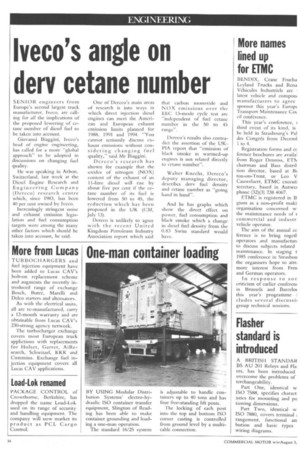Iveco's angle on dery cetane number
Page 16

If you've noticed an error in this article please click here to report it so we can fix it.
SENIOR engineers from Europe's second largest truck manufacturer, Iveco, are calling for all the implications of the proposed lowering of cetane number of diesel fuel to be taken into account.
Giovanni Biaggini, Iveco's head of engine engineering, has called for a more "global approach" to be adopted in discussions on changing fuel quality.
He was speaking in Arbon, Switzerland, last week at the Diesel Engine Research and Engineering Company (Dereco) research centre which, since 1983, has been 40 per cent owned by Iveco.
Increasingly stringent noise and exhaust emission legislation and fuel consumption targets were among the many other factors which should be taken into account, he said. One of' Dereco's main areas of research is into ways in which direct injection diesel engines can meet the American and European exhaust emission limits planned for 1988, 1991 and 1994. "You cannot seriously discuss exhaust emissions without considering changing fuel quality," said Mr Biaggini.
Dereco's research has shown for example that the oxides of nitrogen (NOX) content of the exhaust of an 11-litre diesel will rise by about five per cent if the cetane number of its fuel is lowered from 50 to 45, the reduction which has been proposed in the UK (CM, July 13).
Dereco is unlikely to agree with the recent United Kingdom Petroleum Industry Association report which said that carbon monoxide and NOX emissions over the EEC 13-mode cycle test are "independent of fuel cetane number in the 50 to 45 range", Dereco's results also contradict the assertion of the UKPIA report that "emission of black smoke in warmed-up engines is not related directly to cetane number".
Walter Knecht, Dereco's deputy managing director, describes dery fuel density and cetane number as "going hand in hand".
And he has graphs which show the direct effect on power, fuel consumption and black smoke which a change in diesel fuel density from the 0.83 Swiss standard would have.






















































































